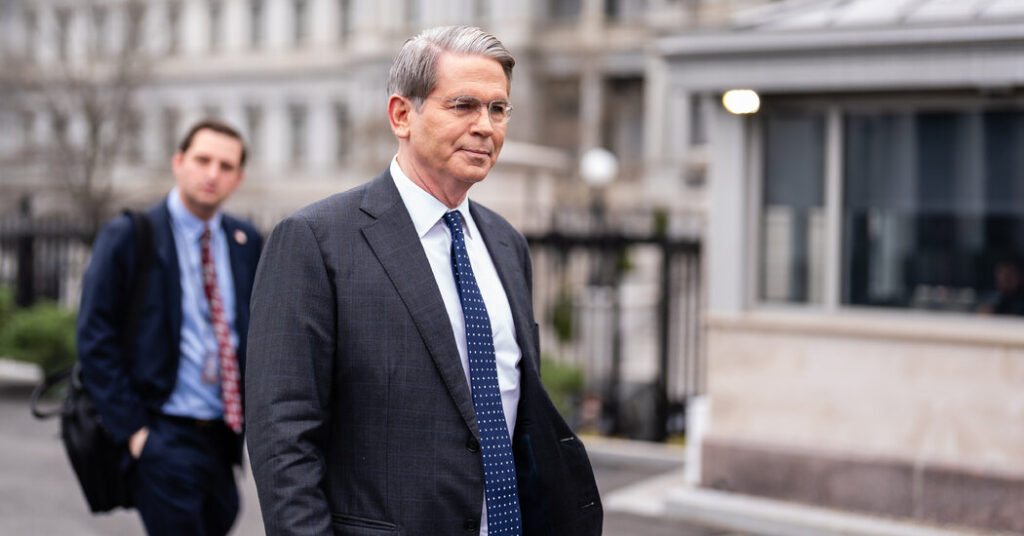On Wednesday, Treasury Secretary Scott Bessent urged significant changes to the roles of both the International Monetary Fund (IMF) and the World Bank. He affirmed that the United States is still dedicated to leading these global economic organizations.
Bessent’s remarks were made during a speech at the spring meetings of the IMF and World Bank, amid worries that the Trump administration might completely withdraw from these institutions.
Recently, the U.S. has disrupted the global trade landscape, and the Trump administration’s stance on climate change, global development, and economic fairness often conflicts with other nations that are stakeholders in these organizations.
On Tuesday, the IMF revised its global growth forecast downward, including for the United States, due to the impact of President Trump’s aggressive tariffs. Ongoing trade disputes between the U.S. and China, the largest economies in the world, threaten to adversely affect economic performance this year and into the next.
In his address, Bessent defended the trade decisions made by the Trump administration and urged China to amend its economic practices, which he claims disrupt international trade. He mentioned that the U.S. is in discussions with multiple countries regarding trade and expressed hope that these negotiations will help restore balance in the global economy and create a fairer trading system.
It is still uncertain when and if the U.S. and China will begin their talks. Mr. Trump has indicated he is hoping to discuss matters with Xi Jinping, the leader of China, but there are no official meetings scheduled yet.
After his speech, Bessent played down rumors that the Trump administration was contemplating reducing tariffs on China without prior discussions with Xi. He insisted that any efforts to reduce trade tensions should be reciprocal.
“Neither party really thinks the current tariff situation is viable,” he stated.
He added, “This is akin to an embargo, and a breakdown in trade relations between the two nations isn’t beneficial for either.”
Guo Jiakun, a spokesperson for China’s foreign ministry, remarked that if the U.S. genuinely wants to address concerns through conversations, it needs to stop its threats and coercive actions, and instead engage with China on equal terms, with mutual respect and benefit.
Bessent made it clear that the Trump administration does not intend to distance itself from the IMF and the World Bank, despite its reservations.
“‘America First’ doesn’t equate to America standing alone,” he asserted. “In fact, it’s a plea for greater collaboration and respect among trading partners.”
He continued, “Instead of retreating, ‘America First’ aims to enhance U.S. influence within institutions like the IMF and World Bank.”
Nonetheless, the Treasury Secretary did not shy away from criticizing these institutions, established in 1944 to stabilize the global economy post-World War II.
“The IMF has been affected by mission drift,” Bessent commented during his address to the Institute of International Finance. “The IMF’s original dedication to fostering global monetary cooperation and financial stability has shifted, and it now spends considerable time addressing matters like climate change and social issues.”
Bessent expressed that this shift in focus has overshadowed the IMF’s economic responsibility: “These concerns fall outside the scope of the IMF’s mission.”
He also criticized the World Bank, which has increased its emphasis on tackling climate change under the Biden administration.
“The bank should not expect unlimited funding for superficial initiatives accompanied by half-hearted reform promises,” he stated. “As the bank refocuses on its primary mission, it must maximize the effectiveness and efficiency of its resources and demonstrate real value for all member nations.”
Bessent praised the bank’s initiative, under Ajay Banga, to rethink its restrictions on loans for nuclear energy projects. He remarked that the bank should adopt a “technology-neutral” approach and prioritize cost-effectiveness in energy investments.
“In many instances, this means investing in gas and other fossil fuel energy production,” he noted. “In other cases, it may involve investing in renewable energy alongside systems to manage the variability of wind and solar.”
Mr. Banga has been emphasizing the importance of job creation for economic development and the inclusion of the private sector in global projects.
Last week, he mentioned ongoing discussions with the Trump administration about the future direction of the World Bank.
“We are having a productive dialogue with the U.S. administration,” Banga noted. “I’m uncertain of where this will lead, but I have no issues with the conversations taking place.”
“They’re asking the right questions, and we’re striving to provide the right answers,” he added.


